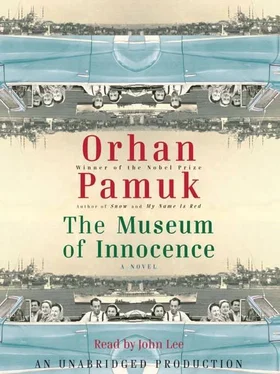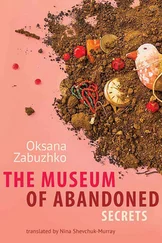When my mother liked or generally approved of someone, she would make sure he heard it when she discreetly told us so, because she enjoyed seeing in his embarrassment proof of her own power. My mother was smiling with this satisfaction when the Silver Leaves resumed with a very slow, sentimental number. I saw Zaim escort Füsun to the dance floor. “Let’s talk about Satsat’s chances in the provinces now, while my father is here, too,” I said. “My son, are you telling me that you are going to talk business now, at your own engagement party?” “Madam,” said Kenan to my mother, “you may not be aware of this, but three or four times a week, when everyone else has gone home, your son stays very late and carries on working.” “Sometimes Kenan and I work late together,” I added. “Yes. Kemal Bey and I enjoy our work,” said Kenan. “Sometimes when it’s very late we make up expressions that rhyme with the names of the people who owe us money.” “That’s fine,” said my father. “But what do you do with the bounced checks?” “I would like for us to meet the distributors to discuss this, Father,” I said.
As the orchestra played one slow dance after another, our talk ranged from possible innovations at Satsat, to the places of entertainment that my father had frequented in Beyoğlu when he was Kenan’s age, to the methods adopted by İzak Bey (my father’s first accountant), to whose table we now turned, raising our glasses in what must have seemed to the accountant a puzzling tribute, after which we went on to contemplate what my father hailed as the beauties of youth and of this evening, and, he added in jest, of “love.” Despite my father’s pressing the matter, Kenan would not be made to admit whether or not he was in love. This did not stop my mother from grilling him about his family, and upon learning that his father was employed by the city council and had for years worked as a streetcar driver, she said with a sigh, “Oh how beautiful they were, those old streetcars!”
More than half the guests had left by now. My father was having a hard time keeping his eyes open.
As my mother and father kissed us each on our cheeks, preparing to take their leave, my mother said, “Don’t you stay out too late either, my son,” looking into Sibel’s eyes, not mine.
Kenan wanted to return to his friends at the Satsat table, but I wouldn’t let him go. “Let’s find my brother and discuss this shop we might open in Izmir,” I said. “It’s not often that the three of us are together in one place.”
I took it upon myself to introduce Kenan to my brother, and my brother (who had known him for some time) raised an eyebrow in disdain, declaring that I must be seriously drunk. Then he looked at Berrin and Sibel, nodding in the direction of the glass in my hand. Yes, I had downed two glasses of raki at around that time, one after the other, because every time I caught a glance of Zaim dancing with Füsun, the raki was my only relief from a ridiculous jealousy. As my brother talked to Kenan about the logistics of collecting on overdue accounts, everyone at our table, including Kenan, watched Zaim dancing with Füsun. Even Nurcihan, who had her back to them, sensed that Zaim had taken an interest in someone else and she was becoming uneasy. At one point I said to myself, “I am happy.” As drunk as I was, I still felt as if everything was going to go my way. On Kenan’s face I recognized an all too familiar species of disquiet, and so I took this long, slender glass (see exhibit) and poured a consoling raki for my ambitious greenhorn friend, who, on account of his bosses having taken a sudden interest in him, had lost the girl he’d been holding in his arms only a few minutes before. At that moment, Mehmet finally asked Nurcihan to dance, and Sibel turned to give me a conspiratorial wink, adding sweetly, “You’ve had enough, darling. Don’t have any more.”
Charmed by her solicitude, I took Sibel to the dance floor, and the moment we got there I knew I had made a mistake. The Silver Leaves were playing “A Memory from That Summer,” which called to mind the previous summer, when Sibel and I had been so happy, and as the music evoked these memories with arresting force-just as I hope the exhibits in my museum are doing-Sibel embraced me as if for the first time. How I wanted in return to embrace with the same ardor my fiancée, the one with whom I was to share the rest of my life. But I could think only of Füsun. Because I was trying to catch a glimpse of her in the crowd, because I did not want her to see me in a warm embrace with Sibel, I held myself back. I let the other couples distract me. They smiled at me affectionately, as people will at seeing a groom a little worse for wear at the end of his engagement party.
At one point we came shoulder to shoulder with the best-loved columnist of that era dancing with an attractive dark-haired woman: “Celâl Bey, love has nothing in common with a newspaper column, does it?” I said. When Mehmet and Nurcihan came alongside us, I treated them as if they’d been lovers for ages. I slurred an attempt at a quip in French to Zümrüt Hanım, who spoke French whenever she visited my mother, even when there was no one around, supposedly to keep the servants from understanding her. By now Sibel had given up on having a dance she would remember forever, and was whispering into my ear, telling me how sweet I was when I was drunk, apologizing for having forced me into matchmaking, which she’d done, she insisted, only to make our friends happy, and alerting me that the fickle Zaim had moved on from Nurcihan and set his sights on that girl who was my distant relation. Frowning, I told her that Zaim was a very good person, and a trusted friend. I added that Zaim had wanted to know why she was treating him so badly.
“So you were talking about me with Zaim? What did he say?” said Sibel. During the break between songs, we came alongside Celâl Salik the columnist again. “I’ve worked out something love has in common with a good newspaper column, Kemal Bey,” he said. “What is it?” I asked. “Love, like a newspaper column, has to make us happy now . We judge the beauty and power of each by how deep an impression it makes on the soul.” “Master, please write that up in your column one day,” I said, but he was listening not to me but to his raven-haired dance partner. At that moment I noticed Füsun and Zaim beside us. Füsun had placed her head very close to his neck and was whispering to him, and Zaim was smiling gaily. It seemed to me that they could see us perfectly well, but were pretending not to notice as they spun around the dance floor.
Without losing a beat I maneuvered Sibel in their direction and then, like a pirate ship pursuing a merchant galleon, I caused us to ram Füsun and Zaim from the side.
“Oh, excuse us,” I said with a silly laugh. “How are you?” The confused joy on Füsun’s face brought me back to my senses and at once I spied in my drunkenness a good excuse for bold action. I turned to Zaim, proferring Sibel’s hand. “May I offer you the honor of this dance?” Zaim took his hand off Füsun’s waist. “You two are going to have to get to know each other better,” I said, “and you might as well start now.” Completing my gesture of self-sacrifice, I put my hands on their backs and pushed them together. As Sibel and Zaim began to dance, with obvious reluctance, Füsun and I looked for a moment into each other’s eyes. Then I put my hand on her waist and with a few gentle turns, moved her as far away as I could, like any elated suitor preparing to abscond with his sweetheart.
How to describe the peace that came over me the moment I took her in my arms? The noise of the crowd that had so addled me, the ungodly racket that I had taken to be the aggregate of the silverware, the orchestra, and the roar of the city-now I knew what I’d heard was only my disquiet at being far from her. Like a baby who will stop crying only in the arms of one particular person, I felt a deep, soft, velvety bliss of silence spreading through me. From her expression I could see that Füsun felt the same; taking the enveloping silence as our mutual recognition of shared enchantment, I wished that the dance would never end. But soon I realized that her half of the silence meant something altogether different from mine. Füsun’s silence harked back to the question I had brushed off earlier as a joke (“What will become of us?”), and now I had to give an answer. I decided that this was what she had come for. The interest that men had shown her this evening, the admiration that I’d seen even in the eyes of the children-all this had given her confidence, had lightened her suffering. Now she might even be able to view me in perspective, as a “passing fancy.” As I began, in my drunkenness, to realize that the night was coming to an end, I was seized by the terrifying thought of losing Füsun.
Читать дальше












